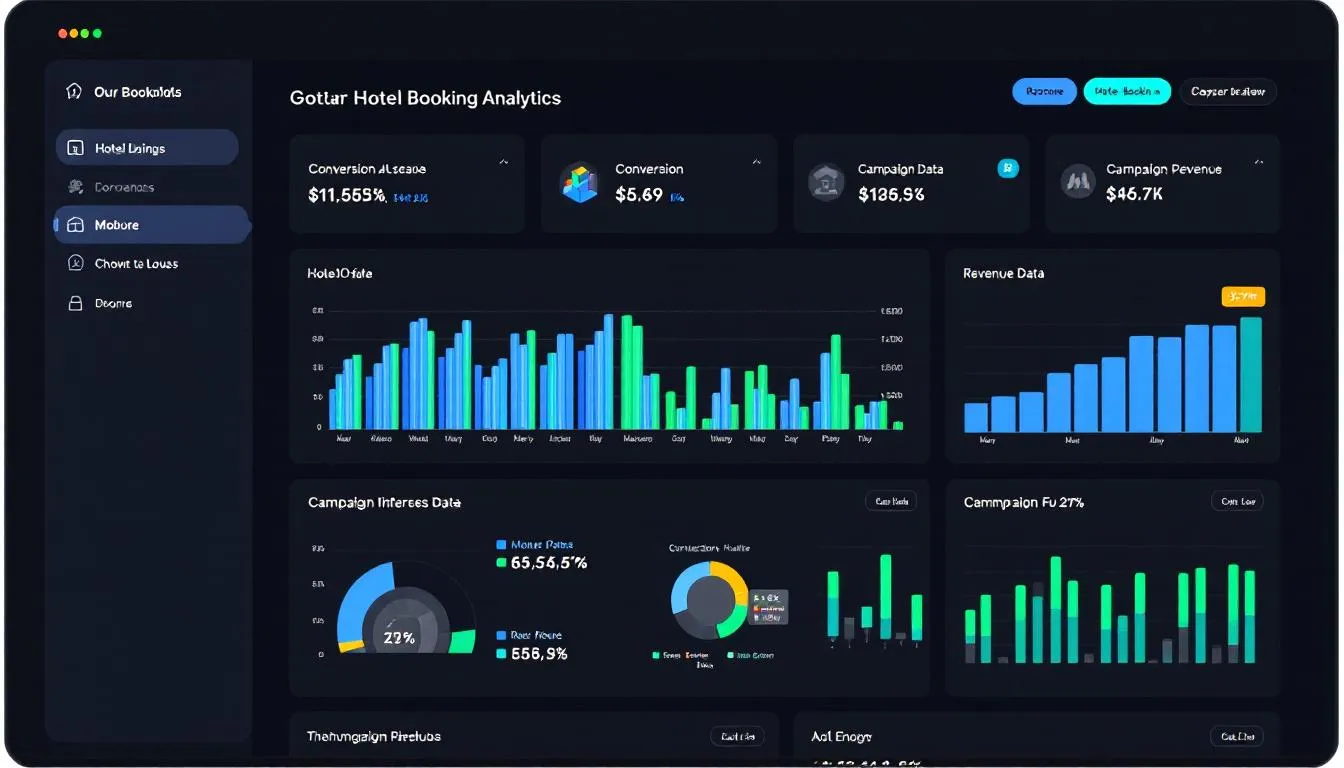PPC for Hotels: Complete Guide to Driving Direct Bookings
 Mika Takahashi
Mika Takahashi Mika Takahashi
Mika TakahashiEvery hotel booking made through an OTA chips away at your profits with commissions ranging from 15-25%. While your competitors might be waiting months for SEO to kick in, ppc for hotels offers a way to drive qualified traffic and direct bookings almost immediately after launching your first campaign. In today’s fiercely competitive hospitality world, getting a handle on pay per click advertising isn’t just a nice-to-have—it’s a must-have.
This guide covers everything you need to know about hotel ppc campaigns, from the basics of setup to advanced strategies that help you outsmart big booking platforms. You’ll learn how to target travelers who are ready to book, how to make the most of your ad spend, and how to build a lasting direct booking channel that puts you in control.
Ppc for hotels is a form of digital marketing for hotels where hotel brands pay only when a potential guest clicks on their online ads. Unlike traditional advertising, where you pay upfront regardless of results, ppc advertising charges you only when someone actually interacts with your hotel ad and clicks through to your website.
When travelers search for accommodation on platforms like Google, your hotel ppc ads can pop up right at the top of the search results. You place bids on specific relevant keywords tied to your property, location, and services. Then, search engines use sophisticated algorithms to decide which hotel ppc ads get shown, based on your bid, how relevant your ad is, and the quality of your landing page.
You set a maximum cost per click you’re comfortable with, but often you pay less than that. This way, you only spend money on ads that bring actual visitors to your hotel website, making your marketing budget more efficient.
Booking through OTAs can cost you a hefty 15-25% commission per reservation. Ppc for hotels flips that script by letting you pay only when someone clicks your ad—usually between $1 and $5 per click, depending on competition and keywords.
To put it in perspective: a $200 room booked via an OTA might cost you $30-50 in fees. The same booking through hotel ppc ads might cost $10-20 in ad clicks, even if it takes a few visits before the guest finalizes their reservation.
SEO is a long game, often taking 6-12 months to build solid organic rankings. In contrast, ppc ads can get your hotel noticed at the very top of Google results within hours of launching your campaign. This instant visibility is especially valuable during busy booking seasons when every moment counts.
Hotel campaigns give you full control over your messaging, letting you highlight what makes your property special—whether it’s unique amenities, special deals, or incentives for booking direct. This helps you stand out from competitors and the big travel sites.
The hospitality space is more crowded than ever, with traditional hotels competing against alternative accommodations and massive booking platforms. Understanding why ppc for hotels is vital requires looking at the current booking landscape and traveler behavior.
Big players like Booking.com and Expedia pour millions into ppc advertising to snag the top spots for hotel-related searches. Without your own hotel ppc ads, your potential guests might see competitor ads before they even find your direct booking options.
These OTAs have huge budgets and smart bidding strategies, but hotels can hold their own by focusing on location-based keywords, highlighting specific amenities, and promoting unique selling points that big platforms can’t match.
Hotel ppc ads shine because they reach travelers actively searching for accommodation—people who are ready to book. Unlike social media ads that target broader audiences, search engines catch users with immediate intent.
When someone types “luxury hotels downtown Portland” or “pet-friendly hotels near airport,” they’re signaling clear booking intent. This qualified traffic converts better than general awareness campaigns, making ppc campaigns a powerful tool for driving more bookings.
One of the best things about hotel ppc ads is the transparency. You can track exactly how many clicks turn into bookings, calculate your cost per conversion, and measure your return on ad spend down to the dollar.
This data lets you optimize continuously. If certain keywords or ad groups bring in profitable bookings, you can increase your budget there. If others underperform, you can pause or tweak them to improve results.
Unlike traditional ads where you pay upfront regardless of results, ppc campaigns give you full control over your budget with daily spending limits. Start small to test the waters, then scale up when you see what works.
This pay-for-performance model means your marketing spend aligns closely with actual business outcomes. When demand is low, your ad spend naturally decreases. When it’s peak season, you can ramp up to capture more bookings.
Bidding on your own hotel brand name is a smart defensive move. It stops competitors from stealing your traffic when travelers search specifically for your property.
Brand campaigns usually have high quality scores and low costs because your ads are highly relevant to those searches. This strategy ensures that guests looking for you find you—not someone else.

To get the most out of your hotel ppc ads, you need tried-and-true strategies that boost conversions and keep costs in check. These approaches help you compete with OTAs and other hotels while growing your direct bookings steadily.
Long-tail keywords are specific search phrases that show strong booking intent but usually cost less than broad keywords. Instead of bidding on “hotel,” go for detailed terms like “boutique hotel downtown Seattle waterfront” or “family resort with kids club Maui.”
These keywords often cost 50-70% less per click and convert better because they match exactly what travelers want. Add location-based keywords like neighborhood names, landmarks, and attractions to zero in on your ideal guests.
Seasonal keywords tied to local events or peak travel times can also bring in high-value bookings. Think “hotel for Mardi Gras New Orleans” or “accommodation during Cherry Blossom Festival DC” to capture travelers with specific timing and willingness to pay.
With 65% of hotel searches happening on mobile devices, optimizing your ppc campaigns for mobile users is critical. Mobile users browse differently and expect fast, easy experiences.
Design mobile-first ads with concise headlines that highlight key benefits like location, price, and amenities. Make sure your landing pages load quickly—ideally in under 3 seconds—to avoid losing visitors.
Include click-to-call extensions so mobile users can call your hotel directly for quick questions or bookings. Simplify your booking forms for small screens by minimizing fields and using dropdowns to reduce typing.
Ad extensions make your hotel ppc ads bigger and better by adding extra info and links. They can boost click-through rates by 10-25% by giving potential guests more reasons to choose you.
Use sitelink extensions to link to specific pages like amenities, photo galleries, special offers, or room types. Location extensions show your address and distance from the searcher, which is especially helpful for mobile users.
Call extensions add your direct booking phone number so guests can reach you immediately. Price extensions display room rates or package deals right in the search results, helping qualify clicks.
Quality Score is Google’s way of rating how relevant and useful your ads are to searchers. Higher scores mean lower costs per click and better ad placement.
Make your ad copy match what travelers are searching for by emphasizing the benefits they care about. For example, if someone searches “business hotel downtown,” highlight your meeting rooms and business amenities.
Make sure your landing pages deliver on your ad promises. If your ad talks about “oceanfront rooms with balcony,” your landing page should showcase those rooms clearly.
Organize your campaigns into tightly themed ad groups so keywords, ads, and landing pages all align perfectly. Regularly test different headlines, descriptions, and calls-to-action to find what works best.
Looking at real-world examples helps you see what works in practice. Different types of properties use ppc for hotels in unique ways to meet their goals and maximize returns.
Sandals Royal Caribbean built a targeted ppc strategy for couples planning romantic getaways and honeymoons. They focused on all-inclusive packages with high-intent keywords around luxury Caribbean vacations and adult-only resorts.
Their ads featured stunning images of overwater bungalows, private beaches, and upscale dining. Copy highlighted exclusive perks like butler service and couples-only areas to justify premium pricing.
They ramped up bids 40% during peak booking months for weddings and honeymoons, capturing high-value reservations at the right time.
The result? A 40% jump in direct bookings during winter compared to the previous year, generating over $2.8 million in revenue with a 6:1 return on ad spend.
Marriott Courtyard targets corporate travelers with hotel ppc ads focused on convenient locations near business districts and airports. Their campaigns highlight meeting rooms, conference facilities, and business centers.
They adjust bids higher during weekdays when business travelers book and lower on weekends.
This approach led to 28% higher conversion rates during the week and a lower cost per conversion compared to leisure-focused keywords.
The High Line Hotel uses ppc for hotels to highlight its unique character and prime location. Their campaigns focus on local events like Fashion Week and Art Basel with tailored messaging about proximity to venues.
They promote Instagram-worthy spots like their garden courtyard and rooftop terrace through ad extensions.
Their neighborhood keyword strategy targets travelers seeking authentic local experiences over generic hotel amenities.
This approach boosted engagement rates by 35% and increased average booking value by 22%.

Getting your hotel ppc ads off the ground with the right setup is key to success. A clear structure helps you control budgets, craft targeted messages, and measure results that drive bookings.
Divide your campaigns by keyword categories for better budget control and optimization. Create separate campaigns for brand terms, generic location and amenity keywords, and competitor names.
Brand campaigns should focus on your hotel name and variations, since these usually have the highest conversion rates and lowest costs. Make sure you allocate enough budget to cover all brand-related searches.
Use geographic targeting to reach guests based on where they are and where they’re traveling from. Create campaigns for local guests, regional travelers, and international visitors with tailored messaging.
Schedule your ads to show during peak booking times based on your historical data, adjusting bids to maximize efficiency.
Allocate your budget wisely—typically 40% to generic keywords, 30% to brand protection, 20% to competitor targeting, and 10% to testing new keywords.
Start with tools like Google Keyword Planner to find relevant hotel search terms and competition levels.
Use SEMrush or Ahrefs to analyze competitor keywords and spot opportunities.
Build negative keyword lists to avoid wasting budget on irrelevant clicks, such as searches for “job,” “cheap,” or “free.”
Organize keywords into tight ad groups with 10-20 related terms to keep ads relevant and quality scores high.
Write headlines that grab attention and clearly communicate your hotel’s benefits, including location, star rating, and amenities.
Use descriptions to highlight what makes your property special, like “free airport shuttle” or “rooftop pool with city views.”
Add strong calls-to-action like “Book Direct and Save 10%” or “Limited Availability – Reserve Today.”
Include seasonal offers or limited-time promotions to create urgency.
Consider using dynamic keyword insertion to automatically include search terms in your ads, but use it carefully.
Tracking your hotel ppc ads’ performance is crucial for ongoing success. Use data to make informed decisions that improve ROI and increase bookings.
Cost per acquisition (CPA) tells you how much you spend on advertising for each booking. Aim for CPA levels that make sense for your property type and rates.
Return on ad spend (ROAS) shows how much revenue you generate for every dollar spent. A 4:1 ratio is a good benchmark.
Click-through rates (CTR) indicate how appealing your ads are. Hotel campaigns usually see 3-5% CTR, with brand campaigns higher.
Conversion rates show what percentage of clicks turn into bookings. Track by campaign, keyword, and device to find areas to improve.
Average booking value helps you focus on keywords and audiences that bring the most valuable guests.
Link Google Analytics to see how visitors behave on your site after clicking ads.
Set up goals for booking form completions, phone calls, and email inquiries.
Use phone call tracking with dynamic numbers to attribute calls to specific campaigns.
Track revenue amounts, room types, and length of stay for detailed insights.
Use attribution modeling to understand the full customer journey.
Set alerts for budget limits or performance changes to catch issues early.

Managing your budget smartly ensures your ppc for hotels campaigns deliver the best bang for your buck.
Small independent hotels often start with $1,000-3,000 monthly budgets to gather useful data without too much risk.
Scale budgets based on occupancy and average daily rates to align spend with revenue potential.
Adjust budgets seasonally—spend more during busy periods and less when demand dips.
Increase budgets for high-performing campaigns and limit spend on underperformers.
Spread your budget across platforms like Google Ads, Microsoft Advertising, and social media to diversify traffic.
Use dayparting to focus spend on times when guests are most likely to book.
Adjust bids geographically to focus on high-value markets.
Modify bids by device type to optimize for mobile, tablet, or desktop users.
Set automated rules to pause poor-performing keywords and boost top performers.
Regularly add negative keywords to prevent wasted clicks.
Avoiding common pitfalls saves you money and improves campaign results.
Don’t rely on broad match keywords without negative keywords—this wastes budget on irrelevant clicks.
Optimize for local search intent like “hotels near me” to capture high-intent mobile users.
Always bid on your own brand name to prevent competitors from stealing traffic.
Consider voice search trends and optimize for natural language queries.
Avoid generic keywords without location modifiers to attract relevant traffic.
Don’t send all traffic to your homepage—use relevant landing pages that match the ad’s promise.
Speed up page load times to reduce bounce rates, especially on mobile.
Simplify booking forms to minimize abandonment.
Add trust signals like security badges and guest reviews.
Ensure your ad copy and landing page messaging are consistent.
Hotel ppc is evolving fast. Staying ahead means embracing new tech and adapting to changing traveler habits.
Machine learning helps optimize bids in real time based on data signals.
Dynamic ad creation keeps your ads fresh and relevant without manual updates.
Predictive analytics forecast demand and suggest budget changes.
Automated budget shifts focus spend on the best opportunities.
Optimize for voice queries that are more conversational.
Use visual search tools like Google Lens by improving your image SEO.
Combine local SEO with ppc campaigns to capture “near me” searches.
Prepare for new social platforms like TikTok and Pinterest that emphasize visual content.
Integrate ppc with email and social media for a seamless marketing experience.
Mastering ppc for hotels is no longer optional—it’s essential for thriving in the digital hospitality landscape. By targeting long tail keywords, optimizing for mobile, and continuously refining your hotel ppc ads based on data, you can drive more direct bookings and reduce reliance on costly OTAs.
Success comes from ongoing optimization, understanding your guests, and staying competitive against both big booking platforms and other hotels. Start with focused campaigns on your strongest points, track your results carefully, and expand as you learn what works best.
Ready to get started with your hotel ppc strategy? Kick off with thorough keyword research tailored to your location and property, set up conversion tracking, and watch as your direct bookings grow. The sooner you launch your hotel ppc ads, the sooner you’ll see your marketing investment pay off.